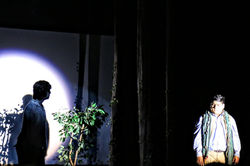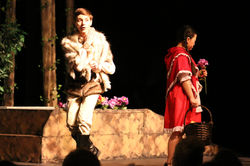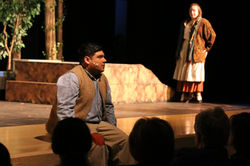Into the Woods

%20(1).png)
Highlights
Program Notes



This was the first entirely student-designed show and the first time the set was primarily built by the student team. It was also the first show to feature a full understudy cast, who served as the "IWA Student Chorus" in all full-ensemble numbers and handled the bulk of the dancing.
When I start to direct a play (especially a musical), I look for a line, a song, or a scene to be my anchor in the show. The secret or not-so-secret heart of the story from which all the rest of the themes, characters, and plot sprout forth. Sometimes it appears early to guide us through the story, like in Sound of Music when the Mother Abbess confesses that her own heart was once torn between religious life and the kind of family Maria finds in the Von Trapps. Often it appears in the literal heart of a play like Shrek the Musical, which ends the first half with the three main characters singing about “Who I’d Be” if the world had been kinder. And sometimes it’s tucked away toward the end, in a quiet scene, like when Benedick and Beatrice advise each other to “Serve God, love me, and mend.”
I had a lot of trouble finding my anchor in Into the Woods. Not because the play lacks beautiful lines or powerful morals. On the contrary, the play is bursting at the seams with lessons (good, bad, right, wrong, and the messy space in between) and with characters eager to share their advice with anyone listening. It’s that bursting energy to explain the world and how it should be that led me to laugh repeatedly that this play is “just so high school…” After all, when else do people run around proudly declaring that they’ve figured the whole world out and distilled it into a single piece of wisdom?
Not that all of the play’s offerings are bad advice. But for every “Opportunity is not a lengthy visitor” there’s “Slotted spoons don’t hold much soup!” Even “Nice is different than good” is later complicated by “You’re not good, you’re not bad, you’re just nice.” And the play cannot make up its mind whether
“No matter what you say, children won’t listen. No matter what you do, children refuse to learn”
Or
“Children will look to you for which way to turn to learn what to be. Careful before you say, listen to me. Children will listen.”
Which is when I finally realized the truth about this play, confirmed more and more with each rehearsal: Into the Woods is not a play about being in high school. Into the Woods is about parenting a high schooler.
That’s why you see our Chorus of understudies scattered throughout the play in their school uniforms. They’ve been told to play heightened versions of themselves, and we’ve invited four of our faculty to join in the fun. I can’t promise they understand what you go through as their parents any better, but we’ve talked about how the characters manage (or not) their own attempts at parenting.
That’s why my anchor to the show isn’t any of the morals above, nor do any of the explicitly stated morals the show constantly offers take the prize. No, my anchor to the show is the oft-repeated, seldom-kept promise:
“Into the woods and out of the woods and home before dark!”
Almost every character in this play, even the more outwardly wizened characters, begins like Little Red Riding Hood, promising her mother not to stray from the appointed path, confident that she’s prepared to navigate the strange terrain, and optimistically promising to make it home before dark.
Even when the woods serve up harrowing adventures and even after those adventures turn sour and deadly, the characters keep insisting that they know what they are doing. But in the end, they all beg one another not to go out alone again...and if they do, to run home where “now there’s you, me, her, and him” when the light starts to grow dimmer.
They won’t listen. Children refuse to learn.
Not until they’ve done things the hard way. Not until they’ve slain the Giant and confronted his grieving widow. Not until they’ve lost the beans and been cursed for their negligence and forfeited what made them special to set things right. Not until they’ve run off with the charming but not sincere prince and learned he is always pining after the girl who got away.
They won’t listen to our warnings that things will end badly along the path they’ve chosen.
All we can hope is that they make it home before dark.
 |  |  |  |
|---|---|---|---|
 |  |  |  |
 |  |  |  |
 |  |

